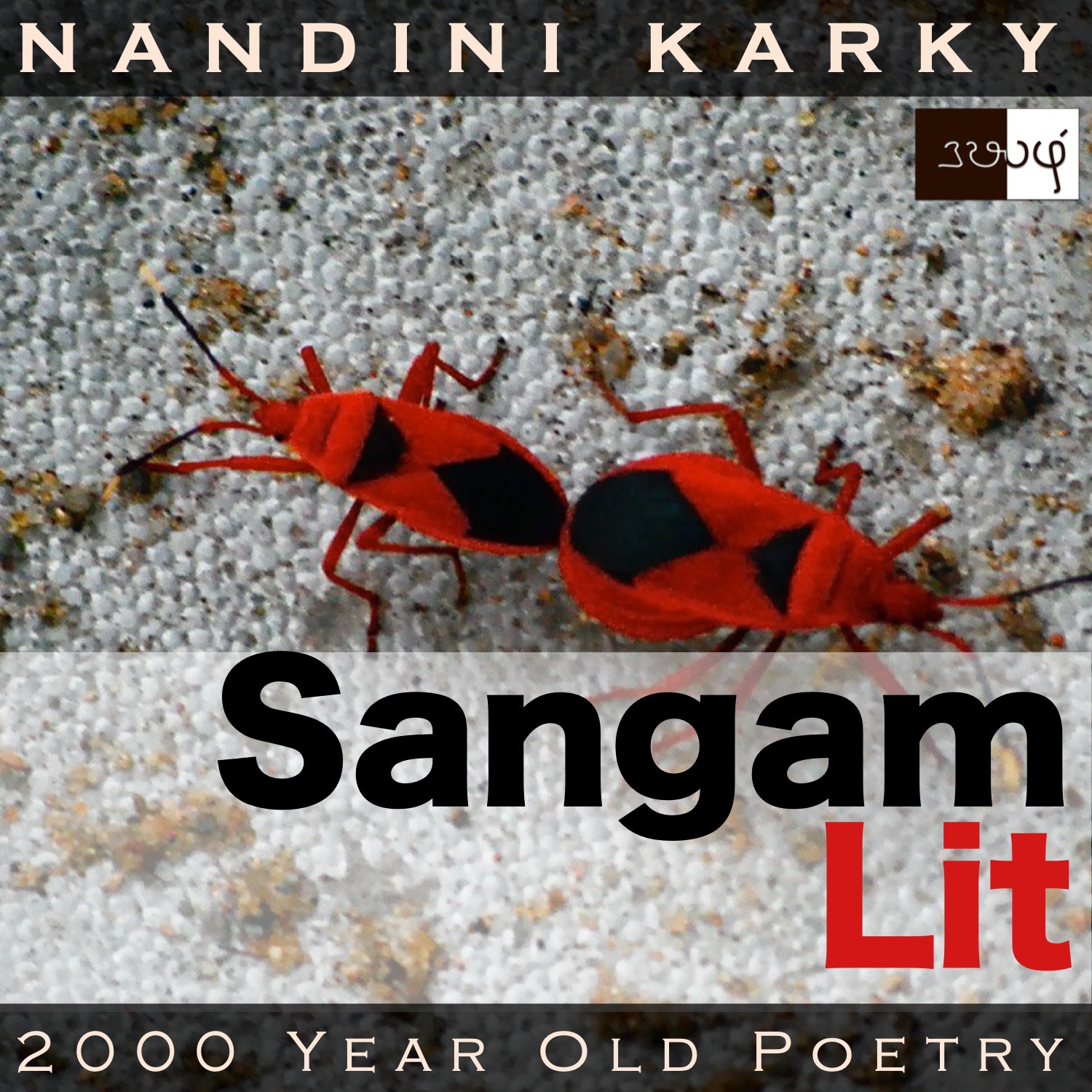Podcast: Play in new window | Download
Subscribe: Apple Podcasts | Spotify | Amazon Music | Android | iHeartRadio | TuneIn | RSS | More

In this episode, we relish the intricate tapestry of imagery interwoven with the history and life of the land, as portrayed in Sangam literary work, Natrinai 180, penned by an anonymous poet. Set in the agricultural region of ‘Marutham’, the verse speaks in the voice of the confidante, in a complaining tone about the ceaseless love-quarrel between the man and the lady.
பழனப் பாகல் முயிறு மூசு குடம்பை
கழனி நாரை உரைத்தலின், செந்நெல்
விரவு வெள்ளரிசியின் தாஅம் ஊரன்
பலர்ப் பெறல் நசைஇ, நம் இல் வாரலனே;
மாயோள், நலத்தை நம்பி விடல் ஒல்லாளே
அன்னியும் பெரியன்; அவனினும் விழுமிய
இரு பெரு வேந்தர், பொரு களத்து ஒழித்த
புன்னை விழுமம் போல,
என்னொடு கழியும்-இவ் இருவரது இகலே.
A fertile agricultural landscape unfolds before our eyes with the word ‘பழனம்’ and its rhythmic echo ‘கழனி’, both referring to ‘cultivated fields’. Learnt ‘பாகல்’ is the ‘vine on which a bitter-gourd grows’. Another little life greets us, as we meet ‘முயிறு’ referring to ‘red ants’. Birds are not to be left behind, and we hear the fluttering of wings, glimpsing ‘கழனி நாரை’ or a ‘field stork’. The leading lady of the poem is referred to as ‘மாயோள்’ translated as ‘dark-skinned girl’, giving clues about the skin tone of Sangam women. The verse ends with the alliteratively exquisite ‘இவ் இருவரது இகலே’ meaning ‘the tiff between these two’. Let’s investigate to see the reason for the fireworks!
The man and lady had been leading a married life when the man took to visiting courtesans. The lady is angered by these actions of the man and refuses to allow him into their home. The man seeks the help of the confidante to win back the affections of the lady. Seeing the lady firm in her fury towards the man, the confidante says, “On a bitter gourd vine growing in the fields, red ants swarm around. A stork that lives in the fields, seeing the red ant nest on the vine, sucks on it and makes the ants fall on the ground and spread, looking like red paddy mixed with white rice. The lord comes from such a town. Desiring the company of many, he doesn’t seek to come home. Even if he does, the dark-skinned lady, does not give in, trusting his goodness. Anni was a great king. But, more glorious than him, was Thithian. The war between these two great rulers on the battlefield ended when the ‘punnai’ tree fell. Perhaps, the quarrel between the lady and the lord too would end, only with my death!” With these words, she describes the impossibility of solving the quarrel between the man and the lady and wonders if the only solution is her demise.
Now, to focus on the individual elements of this interwoven verse. The confidante starts by describing the town the man comes from. It’s a place filled with fields where the nests of red ants on bitter-gourd vines are strewn about by storks and the ants fall on the ground, looking as if red rice and white rice has been mixed together. After the scenic description, she turns to focus on the man’s character sketch. With a single phrase, she outlines how the man has fallen from the virtue of a ‘one man – one woman’ Sangam policy and seems to desire the company of many, meaning that he has taken to visiting courtesans. The confidante adds that because of this, he never turns up at home. After throwing light on the man, she turns her attention to the lady and says, even if he makes up his mind to return to his home, the lady, full of ire, doesn’t allow him. The confidante thus describes a scenario, where the man and the lady seemed to have their backs turned to each other perpetually.
The confidante then, narrates a historical event involving Sangam kings ‘Anni’ and ‘Thithian’. ‘Anni’ wanted to extinguish the fame of ‘Thithian’ and as a lasting symbol of his victory, wanted to cut down the ‘punnai’ or ‘mastwood’ tree that Thithian considered as his guardian deity. Anni arrives to the battlefield and chops down the tree, and soon after, the war ends. This poem doesn’t give us any more clues as to how the war ended but other Sangam poems say Thithian, incensed by this action of Anni, defeated Anni and killed him in the battlefield. Here, the confidante’s focus is only on how the fall of the punnai tree ended the enmity of two great kings. She wonders with dejection if the quarrel between the man and the lady would end only if she were to fall and die, like the punnai. The confidante seems to take her role as the guardian of peace between the man and lady rather seriously. Reminds me of a Hollywood movie dialogue I heard sometime back – ‘It takes three to make our marriage work. Me, my husband and my therapist!’ On that note, let’s part wishing that this Sangam therapist doesn’t have to use such a dire mode of treatment to reinstate the happy, married life of the man and lady!




Share your thoughts...